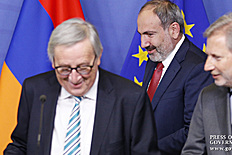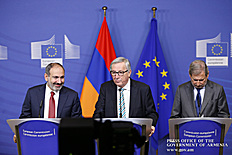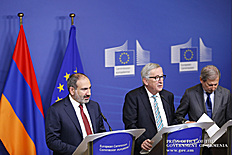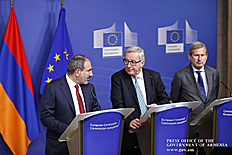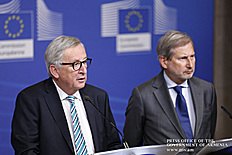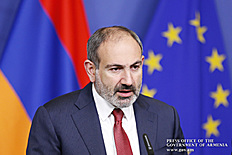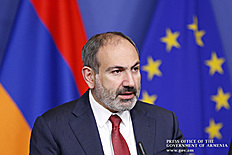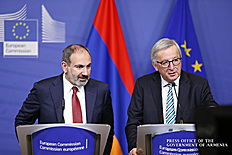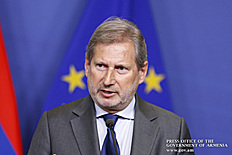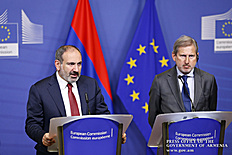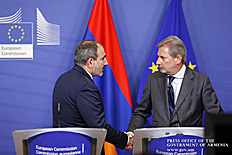Press releases
Nikol Pashinyan and Jean-Claude Juncker made statements; Armenian Prime Minister and Johannes Hahn answered journalists' questions
more 8 photos
Prime Minister Nikol Pashinyan, who is in Brussels on a working visit, and European Commission President Jean-Claude Juncker today made statements for mass media representatives following their talks in Brussels.
RA Prime Minister Nikol Pashinyan and EU Commissioner for European Neighborhood Policy and Enlargement Negotiations Johannes Hahn answered journalists’ questions.
Prime Minister of the Republic of Armenia Nikol Pashinyan:
“Dear Mr. President,
Dear Commissioner Hahn,
Dear Mass Media Representatives,
I would like to thank President Juncker and the EU leadership for the warm welcome and constructive discussions.
Today we had very fruitful discussions on the current state of the Armenia-EU partnership, particularly in the context of the irreversible democratic transformations that took place in Armenia last spring.
I stressed once again the strong commitment of Armenia’s new leadership towards the consolidation of the rule of law, promotion of democracy, uncompromising fight against corruption, as well as artificial monopolies, economic preferentialism and oligarchy, while ensuring full and free exercise of fundamental rights by the people of Armenia.
At the same time, it is axiomatic that in order to keep the democracy viable in any country, we need strong and viable economy. For this reason, the next step for us is the reinforcement of those democratic transformations by further revolutionary changes and reforms in our economy. This is one of the primary goals and the cornerstones of our Government’s new Program.
The European Union is our key trade partner and the biggest donor. During our talks I shared with President Juncker the vision of our Government and our priorities, around which we had useful exchanges. My current visit and meetings with the EU leadership demonstrated our increased mutual interest and readiness to deepen our partnership.
I am glad to note that we have a common understanding with President Juncker that we should continue and deepen our cooperation with the European Union in tackling mentioned problems and bringing into life the ambitious reform agenda of our Government, with the EU’s enhanced political, technical and financial support. In this regard the new Armenia-EU Comprehensive and Enhanced Partnership Agreement is an important platform.
The leadership of Armenia has demonstrated on numerous occasions its commitment and political will towards the effective implementation of this document.
In the course of our meeting we also discussed the ways to expedite the ratification process by the EU Member States, which will allow us to fully benefit from the opportunities envisaged by the CEPA.
Together with our European colleagues, the interagency commission tasked with the coordination of the implementation of the CEPA and the EU-Armenia Partnership Priorities document will soon finalize the CEPA implementation roadmap. Concurrently, the government-civil society consultations on the Road Map are about to be launched.
We regard the CEPA in general and the Roadmap in particular as an essential blueprint for the reforms process in our country.
During all my meetings with the EU leadership we discussed the importance of launching a visa liberalization dialogue, which remains an issue of top priority in our bilateral relations. I have also solicited President Juncker’s personal facilitation in this matter.
I also highlighted that the Armenian government is resolved to the steady implementation of the "20 Deliverables for 2020" document and efficient delivery of its results.
We also touched upon the Nagorno Karabakh peace process. I expressed our appreciation towards the EU’s continuous balanced position on the Nagorno Karabakh conflict, which supports the OSCE Minsk Group Co-Chairs, their position and efforts for the peaceful resolution.
We also reflected on a number of regional and global developments.
To sum up, I would like to once again emphasize the high level of our political dialogue, the atmosphere of mutual understanding and partnership that prevails in our relations with the European Union.
I would like to once again thank you President Junker for the warm welcome and positive dialogue.”
President of the European Commission Jean-Claude Juncker: “I welcome you to Brussels, Mr. Prime Minister. I am very happy to greet you and congratulate you on last year’s elections. The victory of your political force is a piece of good news for Armenia and for us.
The Prime Minister has pinned the reforms and the cooperation with the European Union at the heart of his agenda and we welcome it. The more the Republic of Armenia is reformed, the more we will support Armenia, both financially and politically.
We are going to provide Armenia with 176 million euros for the protection of human rights and fundamental reforms in 2017-2020. But as the Prime Minister has repeatedly mentioned, there is still a lot of work to do, especially as regards the fight against corruption and the judicial reform. We know that the Prime Minister treats those goals seriously and intends to work in that direction. We also talked about the visa liberalization dialogue.
Today, as we have mentioned several times, the technical conditions have already been met, and the time has come to cooperate with all member states so that we can move forward together.
I myself and Commissioner Hahn are ready to support this process as much as possible, and while talking to the Prime Minister, we noted that we were going to launch a stronger dialogue with those member states consistent in this matter. But we, as the European Commission, stand for the start of talks on the visa liberalization dialogue as soon as possible. This is important for both Armenia and the European Union. This is a matter of strong commitment for us as we want more Armenians to travel to the European Union and vice versa.
We do not want people to perceive us only through institutions, we want people to travel freely so that the Armenians could come to Europe without a visa, get closer and better know us. We have also developed six projects to boost ties with neighbors. Continuation is crucial: people need to communicate with each other in addition to their states and governments. And we are trying to do everything in this matter.
I spent more time with the Prime Minister than I had planned. Although I must be off in a few minutes, I will pay close attention to my friend Nikol and the Commissioner.
I must say that Armenia and the European Union are moving forward together. These words are mainly addressed to the Armenian participants in this press conference, we are allies and we are ready to assist Armenia as much as you may wish.”
Question: The second phase of the revolution - the economic revolution - has started in Armenia. I wonder which aspects of cooperation you can see with Armenia in specific areas, taking into account the “more for more” principle. Thank you.
EU Commissioner for European Neighborhood Policy and Enlargement Negotiations Johannes Hahn: “The Prime Minister noted that Armenia presented a roadmap for 13 concrete projects a week ago, and we agreed that greater attention should be paid to the economic component, that is, the support to the business sector. We have already created a result, namely the local banks can provide European loans to small and medium-sized businesses and micro-companies in local currency to eliminate exchange rate risks.
But any economy needs infrastructure. That is why connectivity is very important in our agenda, which calls for investments in roads and railways. It also needs functional electrical networks, energy transmission, export and more.
Energy efficiency is another issue, which may help create jobs in small and medium enterprises rather than in industry. Together with our team, we are now looking for most prospective programs, but there must be different programs. We cannot just do something and ignore others, we must take it together, and as our president said, we are prepared to assist Armenia in all these efforts.”
Question: You met several times with your Azerbaijani counterpart over the past few months. We would like to know whether there are new accents that can be put on record. And if so, we would like to hear Mr. Hahn’s response to the question as to how the EU can step up its support for the peaceful settlement of the Nagorno-Karabakh conflict.
RA Prime Minister Nikol Pashinyan: “You may know that our contacts have been of informal nature and we have not talked about ways and means of settling the Karabakh issue in general. So, I think there is some misunderstanding in your question as to whether there is something to add.
We have yet to begin to discuss, and I have already said in Tehran that our upcoming meeting should inter alia feature a discussion on the format of the negotiations, because we do believe, and our position has not changed so far, that in order to achieve an eventually effective solution, we first of all need to create an appropriate format, which would imply Nagorno-Karabakh’s participation in the negotiation process.”
EU Commissioner for European Neighborhood Policy and Enlargement Negotiations Johannes Hahn: “First of all, I would like to note that during the new prime minister’s term of office, we had an opportunity to organize new meetings between the leaders and the foreign ministers. Those new meetings are already a breakthrough.
As far as our support is concerned, I think we should leave everything as it is in the current format where discussion and negotiations are underway: we need not create anything new. But mutual confidence building steps are very important. And what can we do from the outside as the EU?
We can support the entire region and we can promote cooperation between the countries in different areas. In other words, there should be many opportunities, but there are things that call for some time. Nevertheless, I feel that at this point the conditions in the region are quite favorable for improving the regional situation.
We must support, but only at the request of the parties, because they themselves know what to do, how to work together, and we should be ready to assist if the parties ask us to do so.”
